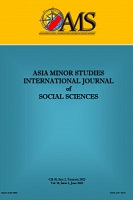Klasik Türk Edebiyatında “Tiryâk-ı Fârûk”
“Tiryâk-ı Fârûk” in Classical Turkish Literature
Author(s): Gülşah Gaye FİDANSubject(s): Turkish Literature, Sociology of Culture, Sociology of the arts, business, education, Theory of Literature, Sociology of Art, History of Art, Sociology of Literature
Published by: Kilis 7 Aralık Üniversity
Keywords: Classical Turkish poetry; St. Omer; Tiryâk-ı Fârûk;
Summary/Abstract: Classical Turkish literature is a literature that emerged under the influence of Islamic civilization. Naturally, especially the Qur'an, hadiths, stories of the prophets and "Hulefa-ı Raşidin", that is, St. Abu Bakr, St. Omar, Mr. Osman and St. Ali's lives and legends have been important sources of this literature. St. Ömer, one of Çehâr-Yârı Güzîn, is known by the nickname "Fârûk". The name Fârûk, which is derived from the root of difference, which means to separate, to divide; means fair, who separates the right from the wrong. In this respect, generally St. Omar's justice is reminded. "Tiryak" is a kind of paste used against poison and some diseases, it is an antidote and the most effective one is "tiryâk-ı fârûk". Since it destroys the effects of animal poisons and poisonous drinks, that is, it separates the body from the poison, this tiryâk is called fârûk. The reason for establishing a relationship between Tiryâk-ı fârûk and St. Omer is a legend of St. Omer as well as his nickname "Fârûk". According to the rumor, one day the Greek ambassador gave Omar poison to kill his enemies. Omer, on the other hand, states that his own worst enemy is his soul, and drinks the poison, but he is not poisoned. By referring to this legend, it is reminded that St. Omer does not need an antidote and that he distinguishes the poison from his body. Therefore, a relationship is established between tiryâk-ı farûk and St. Omer. In classical poetry, St. Omer is generally referred to as justice, but in this study, apart from the general tendency of St. Omer's justice, a different use of him as "Tiryâk-ı Fârûk" in the context of poison-antidote will be examined.
Journal: Asia Minor Studies
- Issue Year: 2022
- Issue No: 2
- Page Range: 173-178
- Page Count: 6
- Language: Turkish

